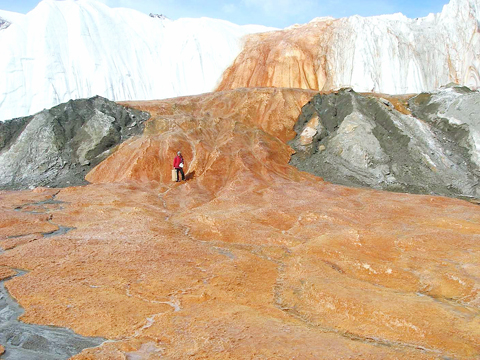US proposals for binding restrictions on Antarctic tourism have been adopted by countries with ties to the region in a bid to protect the continent’s fragile ecosystem, officials said on Friday.
Signatories of the Antarctic Treaty, launched in Washington 50 years ago, capped 11 days of talks in Baltimore, Maryland, by agreeing to impose mandatory limits on the size of cruise ships landing in Antarctica and how many passengers they can bring ashore.
Another resolution placed a mandatory shipping code on vessels in Antarctica, boosting shipping safety efforts underway at the International Maritime Organization, while a third enhanced environmental protection for the entire Antarctic ecosystem.

PHOTO: AP
“We are happy with the results,” said Evan Bloom, who led the US delegation at the summit, noting that the measures were largely in line with needs emphasized by US Secretary of State Hillary Clinton.
Although the measures were adopted by consensus without opposition, they were all subject to negotiation and will become legally binding once ratified by each of the 28 countries that have signed the Antarctic Treaty, he told reporters in a teleconference.
Although no specific mechanism was detailed to enforce the restrictions, signatories would be required to prevent ships with more than 500 passengers from reaching landing sites in Antarctica and allow up to 100 passengers on shore at any given time.
Nearly 400 diplomats, experts and polar scientists from 47 countries attended the meeting, which tackled environmental and territorial issues affecting the Antarctic.
The Antarctic Treaty Consultative Meeting (ATCM) also focused on promoting scientific research in the Antarctic, its chair Tucker Scully said.
He said there was “a major emphasis” on ensuring that the parties cooperated to support scientific research “to understand what is in fact happening to our planet with respect to climate.”
In opening the first joint session of the ATCM and the Arctic Council on April 6, Clinton said Washington would work with other countries surrounding the region “to strengthen peace and security and support economic development and protect the environment.”
The diplomatic chief said she and US President Barack Obama were “committed” to having the US Congress ratify the Law of the Sea Convention, a UN text on maritime rights drafted in 1982.
The US signed the convention in 1994 after securing changes to certain provisions deemed against US interests. But Congress never ratified the treaty, despite a lobbying effort by former US president George W. Bush in 2007.
Clinton said Obama had provided the US Congress with an annex to the treaty for ratification. The annex set the obligations of signatories in case of an environmental catastrophe in the South Pole region.

With much pomp and circumstance, Cairo is today to inaugurate the long-awaited Grand Egyptian Museum (GEM), widely presented as the crowning jewel on authorities’ efforts to overhaul the country’s vital tourism industry. With a panoramic view of the Giza pyramids plateau, the museum houses thousands of artifacts spanning more than 5,000 years of Egyptian antiquity at a whopping cost of more than US$1 billion. More than two decades in the making, the ultra-modern museum anticipates 5 million visitors annually, with never-before-seen relics on display. In the run-up to the grand opening, Egyptian media and official statements have hailed the “historic moment,” describing the

‘CHILD PORNOGRAPHY’: The doll on Shein’s Web site measure about 80cm in height, and it was holding a teddy bear in a photo published by a daily newspaper France’s anti-fraud unit on Saturday said it had reported Asian e-commerce giant Shein (希音) for selling what it described as “sex dolls with a childlike appearance.” The French Directorate General for Competition, Consumer Affairs and Fraud Control (DGCCRF) said in a statement that the “description and categorization” of the items on Shein’s Web site “make it difficult to doubt the child pornography nature of the content.” Shortly after the statement, Shein announced that the dolls in question had been withdrawn from its platform and that it had launched an internal inquiry. On its Web site, Le Parisien daily published a

China’s Shenzhou-20 crewed spacecraft has delayed its return mission to Earth after the vessel was possibly hit by tiny bits of space debris, the country’s human spaceflight agency said yesterday, an unusual situation that could disrupt the operation of the country’s space station Tiangong. An impact analysis and risk assessment are underway, the China Manned Space Agency (CMSA) said in a statement, without providing a new schedule for the return mission, which was originally set to land in northern China yesterday. The delay highlights the danger to space travel posed by increasing amounts of debris, such as discarded launch vehicles or vessel

RUBBER STAMP? The latest legislative session was the most productive in the number of bills passed, but critics attributed it to a lack of dissenting voices On their last day at work, Hong Kong’s lawmakers — the first batch chosen under Beijing’s mantra of “patriots administering Hong Kong” — posed for group pictures, celebrating a job well done after four years of opposition-free politics. However, despite their smiles, about one-third of the Legislative Council will not seek another term in next month’s election, with the self-described non-establishment figure Tik Chi-yuen (狄志遠) being among those bowing out. “It used to be that [the legislature] had the benefit of free expression... Now it is more uniform. There are multiple voices, but they are not diverse enough,” Tik said, comparing it